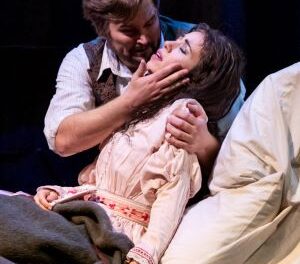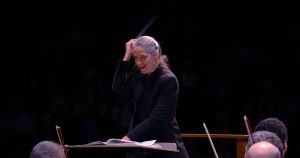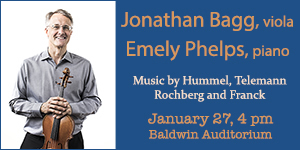Holiday pops concerts are big fundraisers for orchestras, few of which dare close out their calendar years without them. They’re the counterparts to ballet companies’ Nutcrackers, choirs’ Messiahs, operas’ Amahls (or Hansel and Gretels), and theatres’ Christmas Carols – although truth to tell the symphony folks probably make a good deal less on their concerts than these other presenters do with their offerings. That said, there always seem to be audiences for these things, as kids who were introduced to seasonal offerings by their parents grow up to haul their own offspring to experience them. And they’re what keep a lot of these arts organizations afloat, too, so it’s a fact that on many a Christmas eve in America, senior staffs of presenters everywhere get together to crush a cup, count the money, and sing “What a friend we have in Jesus.”
The Durham Symphony Orchestra‘s stand-alone pops concert – they give this program once, and that’s that – is one of our region’s best. The venue is the Durham Armory, which has a nice drill-hall floor for table seating and an upstairs balcony where the sound and the sightlines are almost certainly superior. The lighting’s harsh and if there’s a dimmer switch it wasn’t used, and there’s no shell for the orchestra or band, so some amplification is apparently essential. Still, for this year’s edition, the place was nicely decorated, with wreaths here and there and with small flower arrangements and candles on the tables, and the dessert buffet was a good deal more generous than some of us geezers really needed. They pressed a young composer and conductor into serving up the spirits, literally – I am not sure I could have been trusted with that task when I was his age. And they recruited David F. Bartlett as a gregarious MC, clad in a truly outrageous musical suit. What’s not to like?
Oh, and there was music, too, and from a variety of performers in addition to the orchestra itself.
The headliner this time was soprano Louise Toppin, currently chair of music at UNC – that’s her day job – but in widespread demand as one of our premier vocalists as well. She’d begun her day in Boston, wrapping up a conference there, so she must have been (as we say) plum tuckered out, but aside from a somewhat rough start in Pietro Yon’s “Gesu Bambino” (further marred by a problem with her microphone), she demonstrated total confidence and radiance. Her diction is as exceptional as her vocalism, so every word was clear, and those phrases were invariably rendered without blemish. In “Rejoice Greatly,” from Messiah, her depth of scholarship was manifest throughout, the embellishments in the repeat truly exceptional, and the partnership with the orchestra was remarkably fine, too. She was back in the second half for a wonderful and fairly new work by the DSO’s music director, of which more anon.
William Henry Curry is the orchestra’s conductor, and he seems truly to relish these programs, always projecting delight at the music and generally giving the impression that he is hearing it for the first time, an impression he conveys to his hearers so to them the music also sounds completely fresh. He began with Mendelssohn’s “Hark! the Herald Angels Sing” in an orchestral version, and after the Yon he delivered a glorious reading of the pantomime scene from Hansel and Gretel, a traditional Christmas opera too long neglected in these parts (but have no fear: the part we heard in Durham is some of its very best music).
After the Messiah aria, G. Oakley Lyon conducted the world premiere of his “Winter’s Snow in a Summerland,” dedicated to his wife and his mom, who showed up to surprise him on this occasion, coming all the way from Iowa. The score reflects an ice storm here, actually, but the music depicts much of the universal appeal of such meteorological events. It’s an effective piece with several contrasting sections and some exciting passages that display considerable energy. The performance furthered Curry’s plan to present at least one American work on each and every DSO program – a noble goal, indeed. (We first heard Lyon’s music a year and a half ago, at another DSO concert.)
Leroy Anderson’s all-encompassing Christmas Festival, led by Curry, brought the first half to a heartwarming close.
Part two began with singers from the aptly-named Durham Nativity School under the leadership of Randy Shepard (whose bio is included here) performing “Mary Did You Know” and “The Little Drummer Boy,” the former assisted by Matt Vooris, conga, and the latter with the Durham Symphony Youth Percussion Ensemble, whose members are from the school and whose director is Vooris. To wrap this group of selections, Shepard conducted the chorus and orchestra in a fine version of “Jingle Bell Rock” that had been orchestrated by Lyon.
Jackson Cooper then came forward to conduct the DSO in Herbert’s “March of the Toys.” Eagle-eyed readers will recognize him as a CVNCer but his skills are wide-ranging; he’s also the new executive director of Chamber Music Raleigh. He’s eagle-eyed, too, and the performance was a considerable success, with lovely playing from the orchestra. He also led Curry’s superb Christmas composition, “Snow is Falling Here,” in which Toppin sang with radiant tone and keen artistic understanding. This music has been heard before under the composer’s direction. It’s a work we could stand to hear much, much more, a standout here that was among the evening’s most important offerings.
But we still weren’t through, since there was the (obligatory?) sing-along, this time featuring five songs arranged by Bruce Chase (texts provided!) that will allow another whole roomful of patrons to say they’ve sung with the DSO under Maestro Curry’s direction.
And that was a big enough deal to prompt an encore: “Sleigh Ride” capped the concert and the night’s music, to considerable applause from the grateful audience. Not bad for the evening before the second Sunday in Advent!
P.S.: There was also a silent auction, all proceeds from which went directly to the orchestra. It’s one way for groups that are not at the tops of their respective games (in terms of audiences and financial support) help to sustain themselves so they may continue to propagate their art. Well done!













